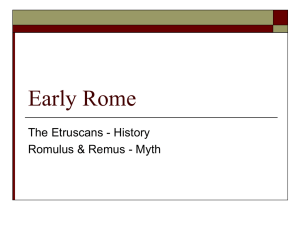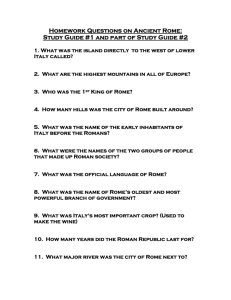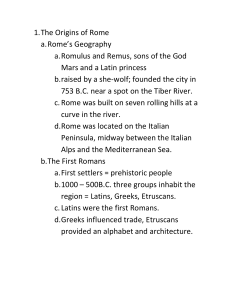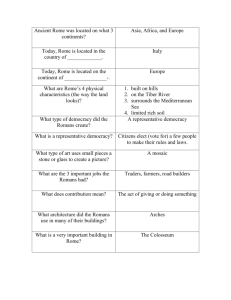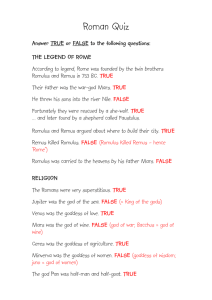romulus and remus comic strip - Boyertown Area School District
advertisement
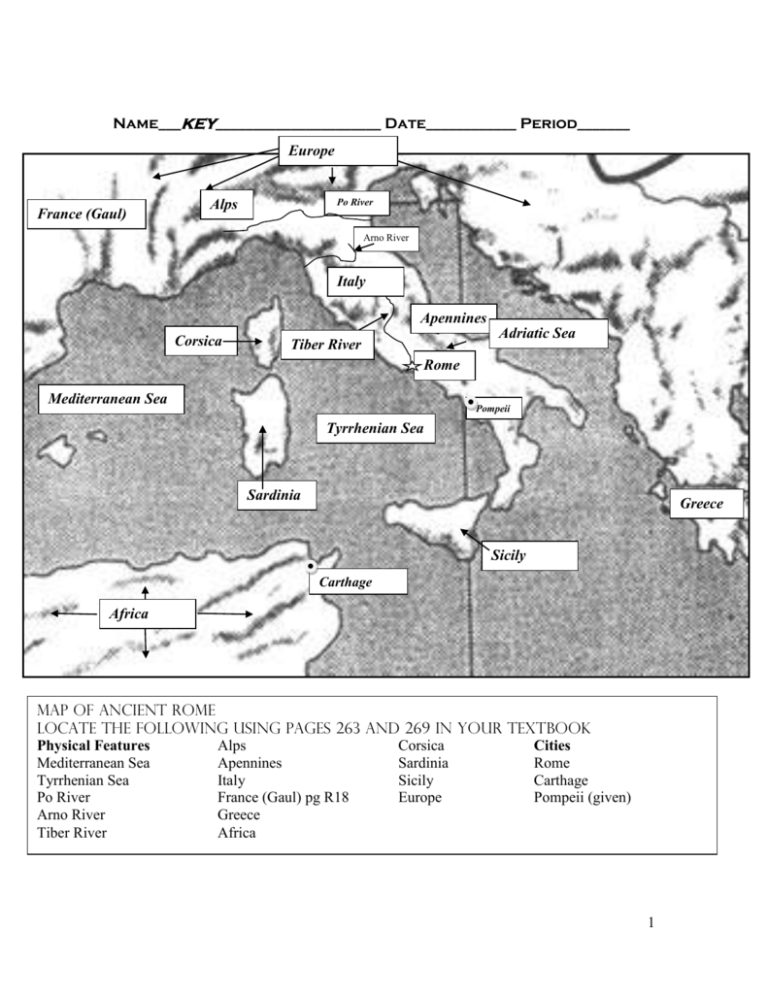
Name___KEY______________________ Date____________ Period_______ Europe France (Gaul) Po River Alps Arno River Italy Apennines Corsica Adriatic Sea Tiber River Rome Mediterranean Sea Pompeii Tyrrhenian Sea Sardinia Greece Sicily Carthage Africa Map of Ancient Rome Locate the Following using pages 263 and 269 in your textbook Physical Features Alps Corsica Cities Mediterranean Sea Apennines Sardinia Rome Tyrrhenian Sea Italy Sicily Carthage Po River France (Gaul) pg R18 Europe Pompeii (given) Arno River Greece Tiber River Africa 1 Geography of Rome 1. On what continent is Italy Located?___Europe____________________________ 2. On what continent is Carthage located?____Africa___________________________ 3. What River flows through Rome?____Tiber River____________________________ 4. What river flows into the Adriatic Sea?___Po River_________________________ 5. What mountains Protected Italy from Northern Invasion?___Alps_______________ 6. What mountains run down the Italian Peninsula?__Apennine Mts.________________ 7. Italy is what direction from Greece?___West_______________________________ 8. How did the geography of Italy influence where people settled?__Mountains and seas protected the lands______________________________________ Thought Question-Why do we study Rome? Republic, gladiatorial games (football), architecture, etc. Directions: Read pages 57-66 in Greek and Roman Civilization, then answer the following questions. 1. Latium, a plain in ____central________ Italy, is where a small village, known as ___Rome_____(city) began. 2. The _____Latins_______ were the first settlers of Latium. 3. What advantages were there in the Latins establishing Rome on a hill known as the Palatine? High Grounds= protection from invaders, control of River and the plains, good climate- Mediterranean- Rain- Rivers- lakes (water supply) seas- trade Romulus and Remus 1. According to the legend, Rome was founded by Romulus and Remus 2. The legend says that these twin boys were the sons of Mars (war god) but were raised by a she-wolf and later on by a shepard. 3. What sign did the gods send Romulus and Remus in deciding who would rule their new city? They waited for a sign from the gods (vultures) 6 vultures for Remus/ 12 vultures for Romulus/Romulus is king. 4. According to legend, Rome was named for Romulus 5. Some people said that each vulture stood for the 100 years of the life of the city. 6. How long did Rome last? 753BC-476AD: ___ 1229 years___ 2 ROMULUS AND REMUS COMIC STRIP Directions: Create a Romulus and Remus Comic strip that highlights their story and the establishment of Rome Romulus and Remus This statue shows the twins being suckled by the wolf. 3 4 Name ___________________________________ Date ___________ Class _________ Rome's Beginnings Directions: Filling in the Blanks Reading the section and completing the sentences below will help you learn more about Rome's beginnings. Refer to your textbook pages 263-267 to fill in the blanks. Italy is in an important (1) _____location_____ in the middle of the Mediterranean region. Although Italy's landscape is similar to that of Greece, Italy had better (2) _____farmland_____ (3) _____Geography_____ played a major part in the location of Rome. The city was built on seven steep (4) _____Hills______ that allowed Rome to be easily defended. Although various legends describe the origins of Rome, _____historians_____(5) are not sure how the city began. Two groups, the (6) ____Greeks_________ and the (7)___Etruscans________ played a major role in shaping Roman civilization. The Etruscans influenced the Romans in city planning and dress, and the Etruscan army would serve as a(n) (8) ___model______ for the mighty army the Romans would eventually assemble. In 509 B.C., the Romans rebelled against the Etruscans and set up a(n) (9)___republic________, a form of government where the citizens have the (10) _____right______ to vote. Over the next 200 years, the Romans were able to conquer Italy because the Romans were (11) ____excellent________ soldiers. Every male citizen who owned (12) __land_________ had to serve in the army. The Romans showed themselves to be good planners. They built (13)_____roads_______ that allowed troops to travel swiftly to any place within their growing territory. To rule their new conquests, the Romans created the (14) Roman Confederation. Under this system, the Romans gave full (15)___citizenship_______ to some peoples. (16) _____Allies_______ were free to run their own local affairs as long as they paid taxes to the Romans and provided soldiers for the army. 5 Name:__________________________ Date:______________ Period:______ The Beginnings of Rome You will be completing the following questions by working in groups in a jigsaw activity. Read the information that is provided to you and then answer the questions completely STATION 1 1. Describe the three groups of people that settled in Italy A: Greeks- established colonies in the southern portion of the peninsula B: Latins- settled the Palatine (1 of the “7” hills of Rome) located in the Latium, a plain in central Italy. C: Etruscans- Settled Etruria, the area north of the Tiber River. May have come from Lydia in the Asia Minor 2. Name and explain 3 major contributions of the Etruscans: a. drain marsh lands- provided land on which they build and farm b. leather boots- supported ankles for soldiers marching on rocking terrain c. Etruscan alphabet- created out of Greek alphabet- allowed Etruscans to record information STATION 2 3. What were the classes of the Etruscans and what is a system of ranking people in a social order called? (prior knowledge) They had upper, middle and lower classes. The upper class owned much of the land. A system of ranking people is a hierarchy. 4. Describe some of the things that the Etruscans did for activities to keep themselves entertained. Dice games, chess/backgammon type of games, wrestling, running, boxing and horse races, music, dancing connected with religious celebrations STATION 3 5. Give a brief overview of what the Etruscan religion was like. The Etrsucans were polytheistic and modeled religion after Greek gods and goddesses. West- unlucky East- lucky 6. What was a soothsayer and how did they predict the future. Be sure to explain your answer. A soothsayer was a person who could read omens and predict future events. They used “signs” from nature in order to do this. STATION 4 7. Give a brief description of the catacombs and how they were used in ancient times. Catacombs were used as tombs underground. They buried their dead with treasures for afterlife. Christians will later use them as a safe place to worship in order to avoid arrest. 8. Explain what happened at the banquet of the deceased. Slaves fought one another to the death at the great banquet. Slave’s souls passed into the afterlife with his masters. Roots of the gladitorial games. Continued on the next page… 6 STATION 5 Explain how the following contributions benefited the early Etruscans and Romans. a. Republic- government where people elect their representatives to cote on major issues. Allows government to work over a large area of land. b. Arch- allowed bridges to be built over mountain valleys and rivers c. Sewer systems- this allowed waste water to be carried away d. Forum- created by draining the swampland but it became a central location for meetings- a public square e. Latin- Greek alphabet with vowels added. Basis to Italian, Spanish, Portuguese, English and French. STATION 6 Explain how the following contributions benefited the early Etruscans and Romans. f. Gladiatorial games- Entertainment to please Roman mobs- pitted man against man and man against beast g. Fasces- symbol of Etruscan authority h. Triumph- a parade-like welcome for victorious returning troops- morale booster i. Triumphal arch- permanent memorial to commemorate a ruler’s successes or accomplishments. Latin Influence on English Many languages have affected the development of Modern English. A group of words that had a very important influence has been Latin, which was brought to England by the early missionaries and sailors. Many Latin words were quietly adopted, and slightly changed by the English speaking people, and they became part of the English. Many Latin words were borrowed from the ancient Greek language, and therefore there is a strong Greek influence on English as well. Write the modern English word for these Latin terms in the blank: Latin Old English Modern English 1. candela candel candle 2. strata straet street 3. pruna pluma plum 4. schola scol school 5. papyrus papire paper 7 Completing a Chart and Drawing Conclusions Even today no one is quite sure of the origin of the Etruscans, because historians are not able to understand the small number of Etruscan writings that have been found. Etruscan contributions to the later Roman civilization, however, have been recognized. Use the knowledge you have already gained in order to complete the chart and answer the questions that follow. Field Etruscan Contributions to Roman Civilization Arch- bridges, aqueducts Architecture Running water, draining marshland, sewer Public sanitation Public meeting place- town center/marketplace The Forum Latin Language and writing Gladiatorial games Entertainment fasces Symbol of authority 1. How might the development of the Etruscan arch have contributed to the building of roads by the Romans? _________Bridges________________________________________________________ ____________________________________________________________ 2. How do you think the Etruscan contribution to the Forum helped Roman farming communities? _____market- place to sell good ________________________________________________________________________ 3. Why do you think entertainment was a part of most early civilizations? _____to keep the masses happy ________________________________________________________________________ Early Rome Study Guide Map Locations- (You should be able to identify where these places are on a map) Cities- Rome / Carthage / Pompeii Islands- Corsica / Sardinia / Sicily Bodies of Water- Tyrrhenian Sea / Adriatic Sea Rivers- Arno River / Po River / Tiber River Mountain Ranges- Alps / Apennines Short Answer Question- Briefly summarize the story of Romulus and Remus. Vocabulary- / fasces / forum / catacombs / keystone / Latin / prophecy / triumphal arch / triumph Places- Carthage / Rome / Latium / Alps / Italy / Europe / Phoenicia People- Romulus / Remus / Etruscans Etruscans- alphabet / catacombs / Mars (the god of war) / belief in the afterlife / leather boot/ East (be able to describe how each of these things were important to the Etruscans). 8
